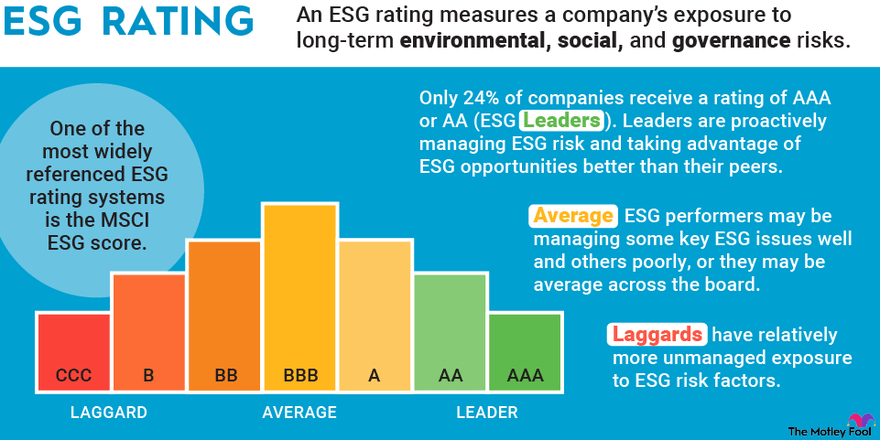Over the last few decades, the business world has seen a shift in the way people measure the performance of a company. Instead of simply looking at the bottom line of profit, investors and potential partners now consider other metrics when they size up a business. The way a company approaches environmental, staffing, and ethical issues have become as important as expenditures, research and development, and EBITDA.
This change led to the creation of environmental, social, and governance (ESG) scores. An ESG score is now a common part of how a company presents itself not only to investors but also to the public.
What is an ESG score?
An ESG score measures a company’s performance when it comes to environmental, social, and governance issues. You could say it’s a score based on how a company approaches business practices when it comes to issues in these three categories.
Environmental- This is how the company interacts and affects the environment. It can take into account waste products, recycling, and energy efficiency as well as its carbon footprint or other environmental and sustainability issues.
Social- This takes into consideration how a company works with the community and society. What causes do they support? What groups does it make donations to? It can even include privacy issues and the ways it interacts with its customer base.
Governance- This is a measurement of the corporate structure, interactions with its workforce, and diversity. It can also include how transparent the company is in its business practices, as well as the actual ESG scoring process.
Factors in an ESG score can include:
The company’s carbon footprint
Amount of waste products
Energy consumption
Employee and board diversity
Worker safety and well-being
Executive payroll
Spends on charitable and political donations
While the categories don’t change, scores can be industry-specific and measure how the entire industry deals with certain issues or they can be larger points that affect society on a wider scale.
An ESG score is determined on a scale of zero to 100. A good score is considered to be over 70 while a score under 50 is seen as a poor performance. Often scores are broken down into three categories:
Leaders- Companies with high scores who are setting the standard for sustainability
Average- Companies who are in the middle of the pack, excelling at some things while other issues might require improvement
Laggards- Low-scoring companies who are noted as needing improvement on multiple issues uncovered during an ESG examination
Microsoft is an example of a leader in ESG with consistent scoring in the 70s. With high profitability, the company has been noted for social and environmental efforts with a keen eye to a sustainable future.
At the other end of the spectrum, companies such as Xerox and EchoStar have low ESG scores, mostly due to personnel and social issues. Xerox has faced claims that because they are not a company with a large public presence, they have not taken steps to implement social change in its practices. EchoStar has been accused of a lack of transparency and not making their environmental or personnel statistics public, leading to a lower score.
Who decides the score?
Third-party groups are brought in to calculate ESG scores. By using an outside organization, the intention is that the score is impartial and cannot be influenced. There are various groups that conduct ESG studies such as the Global Reporting Initiative, Principles for Responsible Investment, and the Sustainability Accounting Standards Board.
Different scoring organizations measure ESG scores in various ways. Some may use industry guidelines while others may apply more current and public metrics. The organizations may take a scoring approach that is more issue or industry-specific. They may also differ in the way they investigate a company’s business practices. For example, the Carbon Disclosure Project is known for its level of investigative depth and for conducting its own research versus simply processing the information given by a company being graded.
Some organizations are very specific in their scoring approaches. One of the largest advisory services in the world, Institutional Shareholder Services offers specific categories such as carbon or water risk ratings, which allows for a focused analysis of a company and its practices in these areas.
It is important that once generated, ESG scores are viewed in an appropriate context, such as overall industry standards or environmental guidelines. If not, the companies could be accused of greenwashing. For example, a company might receive a high score and present its approach as cutting edge, when it is actually just following the laws and regulations required in their industry.
Why is an ESG score important?
Often investors are looking for companies with a high ESG score and require it as part of their consideration for investment. In addition to sustainability practices, it has been argued that a high ESG score results in a company that has less waste, lower energy costs, and a more productive workforce. This makes companies with higher ESG scores attractive to investors who see them as having more potential to be profitable and therefore a more viable investment.
Companies are also seeing expanding requirements to include their ESG scores in their quarterly or annual reports. United States government agencies are beginning to require transparent ESG scores and reports, a practice entities in the European Union have implemented for some time.
The score can also be instrumental when a company looks to conduct business overseas. Countries will turn to the rating to decide if they want the company operating within their borders.
An example is one of the largest economies in the world: China. Although most ESG reporting is voluntary in the country, China recently announced a plan to standardize ESG scores in an attempt to make the grading system more uniform and move toward higher “common prosperity.”
A higher ESG score is also believed to lead to a stronger workforce. Because the treatment of employees is one of the factors, you can see how benefits, perks, and even a pleasant working environment would lead to a more productive workforce. Plus, when it comes to new hires, employees are often looking to be part of progressive and positive stances on environmental issues and sustainability, which can lead to higher-quality applicants.
In addition to regulation requirements, a high ESG score can have a positive effect on a company’s reputation. By publicly showing where the brand stands on issues and being transparent about the inner workings of the company, it can raise the way the public views a business.


